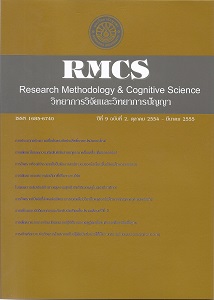โมเดลความสัมพันธ์เชิงสาเหตุความสุขเชิงอัตวิสัยของครูในเขตเมืองพัทยา
Main Article Content
Abstract
การวิจัยนี้มีวัตถุประสงค์เพื่อพัฒนาโมเดลความสัมพันธ์เชิงสาเหตุของตัวแปรที่มีอิทธิพลต่อความสุขเชิงอัตวิสัย (Subjective Happiness) ของครูในเขตเมืองพัทยา และตรวจสอบความสอดคล้องของโมเดลกับข้อมูลเชิงประจักษ์ตัวแปรในโมเดลประกอบด้วย ตัวแปรแฝง 4 ตัว ได้แก่ ความสุขเชิงอัตวิสัย การมีความสัมพันธ์กับผู้อื่นในลักษณะพึ่งตนเอง การสะท้อนคิดด้วยตนเอง และการครุ่นคิด ในตนเองกลุ่มตัวอย่างคือครูผู้สอนในโรงเรียนเขตเมืองพัทยาจํานวน 400 คน เลือกกลุ่มตัวอย่างโดยวิธีการสุ่มแบบหลายขั้นตอน เครื่องมือ ที่ใช้ ในการวิจัยได้แก่แบบวดการมีความสัมพันธ์กับผู้อื่นในลักษณะพึ่งตนเอง แบบวดการสะท้อนคิดด้วยตนเอง แบบวัดการครุ่นคิดในตนเอง และแบบวัดความสุขเชิงอัตวิสัย วิเคราะห์ข้อมูลโดยใช้โปรแกรม LISREL 8.80
ผลการวิจัยปรากฏว่า โมเดลความสัมพันธ์เชิงสาเหตุ ความสุขเชิงอัตวิสัยของครในเขตเมืองพัทยาตามสมมตฐานมี ความสอดคล้อง กับข้อมูลเชิงประจักษ์อยู่ในเกณฑ์ดีมีค่าสถิตไค-สแควร์เท่ากับ 31.71 ค่า df เท่ากับ 29 ค่า p เท่ากับ .33 ค่า GFI เท่ากับ 0.98 ค่า AGFI เท่ากับ 0.97 ค่า CFI เท่ากับ 1.00 ค่า SRMR เท่ากับ 0.03 ค่า RMSEA เท่ากับ 0.01 และค่าสัมประสิทธิ์พยากรณ์เท่ากับ .43 แสดงว่าตัวแปร ในโมเดลสามารถอธิบายความแปรปรวนของตัวแปรความสุขเชิงอัตวิสัยของครูได้ร้อยละ 43 ตัวแปรที่มีอิทธิพลทางตรงต่อความสุข เชิงอัตวิสัย ได้แก่การมีความสัมพันธ์กับผู้อื่นในลักษณะพึ่งตนเอง การสะท้อนคิดด้วยตนเอง และการครุ่นคิดในตนเอง
A Causal Relationship Model of Subjective Happiness for Teachers in Pattaya City
Wanwisa Wongsason
Pattaya City School 7, Pattaya City, Thailand
The purpose of this research was to develop and validate a causal relationship model of subjective happiness for teachers in Pattaya city. The model consisted of four latent variables: subjective happiness, independent self-construal, self-refl ection, and self-rumination. The sample derived by means of multistage sample, consisted of 400 teachers of Pattaya city. The research instruments included independent self-construal scale, self-refl ection scale, self-rumination scale, and subjective happiness scale. Descriptive statistics were generated using SPSS; causal modeling involved in the use of LISREL 8.80.
Results indicated that the hypothetical model was consistent with the empirical data. Goodness of fi t statistics were: chi-square test = 31.71, df = 29, p = .33, GFI = 0.98, AGFI = 0.97, CFI = 1.00, SRMR = 0.03, RMSEA = 0.01. The variables in the hypothetical model accounted for 43 percent of the total variance of subjective happiness. The variable that had statistically signifi cant direct effect on subjective happiness were independent self-construal, self-refl ection, and self-rumination.

